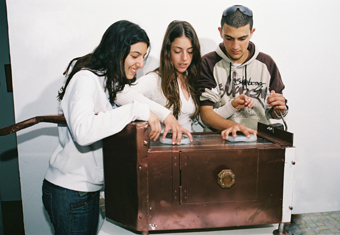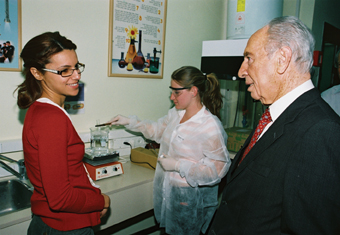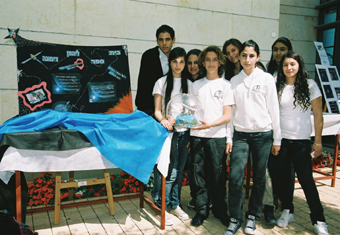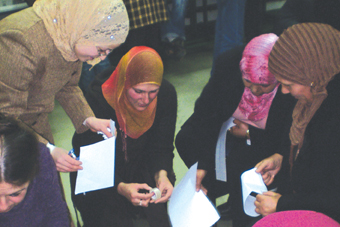A number of scientific tournaments for young people were held recently within the framework of the unit for young people in science - CMD, which is part of the Davidson Institute for Science Education, which brings together the educational activities of the Weizmann Institute of Science

Towards the end of the school year, a number of scientific tournaments for youth were held as part of the unit for young people in science - CMAD, which is part of the Davidson Institute for Science Education, which brings together the educational activities of the Weizmann Institute of Science. About 50 teams of high school students from all over the country and abroad participated in the physics tournament named after Shalhav Peryar. The competing teams were required to design and build a safe, which is locked using an original physical mechanism.
During the competition, the teams tried to break into as many safes as possible - within a limited time. At the same time, the safes were tested according to the number of times the competitors succeeded in deciphering and breaking the locking mechanism, as well as according to the evaluation of a team of judges from Weizmann Institute scientists. The teams that have reached high achievements receive a score of one hundred in the physics laboratory exam.

This year, teams from the USA, Canada, Great Britain, Italy, Moldova, Russia and Israel participated in the competition. The National Mathematics Olympiad named after Prof. Yosef Gillis was held for the 41st time. This year, 69 teenagers participated in it, from dozens of schools across the country. The participants were required to answer a questionnaire compiled by scientists from the Weizmann Institute of Science and other higher education institutions, who also judged the competition. The four winners and the 12 outstanding in the Olympics will receive prizes, including study scholarships. They will also be invited to participate in the Israeli team in the International Mathematics Olympiad that will be held in Madrid, Spain, in July. The award and certificate distribution ceremony took place in June, at the Institute. In the "Kodagoro Extreme" virtual survival competition, the competing teams are required to create "survival" computer programs that attack and destroy the rival programs - and are also able to evade their attacks, and deal with additional threats - "smart bombs" and "zombies" implanted by the creators of the competition. The members of the winning team, from the "Ort" school in Kiryat Bialik, were awarded scholarships amounting to half the tuition fee for a bachelor's degree in computer science at the Interdisciplinary Center in Herzliya.
The "Kodagoro Extreme" competition is a joint initiative of the Young People in Science Unit (JUMD) at the Davidson Institute for Science Education, in collaboration with the companies IBM and "Aladdin", the Interdisciplinary Center in Herzliya, the Association of Veterans of Unit 8200 of the Intelligence Corps, the Information Technology Division of the IDF , the Prime Minister's Office and the Ministry of Education.
In the chemistry tournament, the participating teams were required to create a mixture of materials, as well as crack the composition of competing chemical mixtures using chemical analysis methods: precipitation, contradiction, color reactions, burning, oxidation, and more. First place in the tournament was won by the team from the House of Education and Sciences - Jaljulia High School, second place was won by a team from the Ben-Gurion School in Nes-Ziona, and third place was won by a team from the youth village and the Nir Ha'emek in Afula. The students of the winning teams received a score of 100 in the laboratory unit included in the matriculation exam in chemistry. The President of the country, Mr. Shimon Peres, visited the Davidson Institute on the day of the competition and talked with the students.
In another tournament, the Trivia Olympiad in Mathematics, the participants responded to a questionnaire that was distributed online. The winners of this phase were invited to the final phase, during which they received a special questionnaire adapted for them by Dr. Maria Gorlik and Dr. Dmitry Novikov from the Faculty of Mathematics and Computer Science at the Weizmann Institute of Science. The winners of the Olympics will be announced at the awards ceremony that will take place in June. This year, the Arabic-speaking participants were offered a questionnaire in their language, the preparation of which was assisted by Prof. Idris Titi - also from the Faculty of Mathematics and Computer Science at the Institute.
Remember Ilan Ramon

140 teenagers from Israel and abroad participated in the final stage of the Space, Energy and Environmental Sciences Olympiad named after Ilan Ramon and the crew of the shuttle "Columbia" which was held recently at the Davidson Institute for Science Education, which brings together the educational activities of the Weizmann Institute of Science, in the capacity of Rona Ramon.
The first place went to a team from a new high school named after A. Lehman of Dimona, who developed a program for the treatment of waste in space and its destruction. The winning team will be sent to an astronomy camp to be held in Turkey this summer. The second place went to a team from the "Ort" school named after Greenberg in Tivon, who won the telescope for a research paper on "safe flight in space".
The annual Olympics in memory of the Israeli astronaut Ilan Ramon is an initiative of the Ministry of Education and Dr. Zehava Shertz and Dr. Ilana Hopfeld from the National Center for Middle School Science and Technology Teachers, who lead the project. 14 teams from middle schools across the country, and from the Ramez School in New York, reached the final stage of the Olympics, presenting research works on space science, energy and the environment through explanatory posters and creative models.
Toy Science

The KMP project (active science groups) of the Davidson Institute for Science Education, which brings together the educational activities of the Weizmann Institute of Science, began operating in the city of Tamra in the Western Galilee. The activity was opened in a solemn ceremony, in the presence of the mayor of Tamra and the director of the education department in the municipality. After that, the teenagers and their parents participated in the opening activity of the "Toy Science" course.
Opening the program in the remote settlement required special preparation. Dr. Oved Kedem, the head of the program, Oren Eckstein, the center of the program, and the faculty members from the Davidson Institute recruited and trained a team from the city of Tamra, including a teacher who translated the teaching materials from Hebrew to Arabic. Students from the settlement, who participate as mentors in the Parakh project, help run the program. This activity is supported by the Hila program of the Ministry of Education and the community for community centers.
The Tamra KMP project was at the center of a national conference for the promotion of youth in the Arab sector, which was held recently in Tamra, and as a result, the leaders of the program hope that the project will be implemented in other places as well.
Additional events for the general public that took place at the Weizmann Institute:
- Bioethics now:Current bioethical issues were at the center of a series of meetings open to the public held recently by the Davidson Institute for Science Education, which brings together the educational activities of the Weizmann Institute of Science. The moderator of the series, Prof. Michel Rebel from the Weizmann Institute of Science, chairman of the National Council for Bioethics, and winner of the Israel Prize, stated in his opening remarks that the purpose of the meetings is to increase public awareness of the moral questions that arise as a result of medical and technological progress, and emphasized the importance of public discourse on the issues goddess. The large crowd that gathered in the "Duck" hall at the Davidson Institute, and the lively discussions that took place at the end of the lectures, proved that the public, for its part, does want to know more. Following the great success of the meetings, requests were received to hold the series once more. The three meetings were initiated and organized by Dr. Ilana Schmidt-Hopffeld, coordinator of the National Council for Bioethics and member of the science teaching department at the Weizmann Institute of Science, who chose the topics of the meetings, Dr. Zehava Sharatz , head of the science program for the general public, and Dr. Usherit Navon, who coordinates the program. The meetings were held with the support of the National Council for Bioethics, and with the funding of the Hanan Bar-On Memorial Foundation.
- Science and Industry:The XNUMXth grade students who participate in the HC program (young researchers) recently visited the "Applied Materials" factory in Kiryat Hadam in Rehovot. The purpose of the factory tour is to expose the students to the connection between the basic science, which they encounter in the institute's laboratories, and the knowledge-rich industry. The visit was initiated by Dr. Rakfat Stuerman, Orit Kaufman and Dr. Felix Laub, the heads of the program. The foreign exchange program for outstanding students is operated by the unit for young people in science (JMSD), as part of the activities of the Davidson Institute for Scientific Education, and about two hundred students participate in it every year. The students listened to a brief explanation of the scientific, technological and business aspects of the manufacturing and development processes of the chips. After that, they toured the factory's clean room, where they observed closely the testing and control machines that are developed and manufactured at "Applied Materials" Israel.
- Food for thought:Outstanding students from the XNUMXth and XNUMXth grades were invited to listen to the fourth Katzir-McKinney lecture. Prof. Ephraim Katzir greeted the students - those who listened to the lecture in the Weeks Hall, and those who watched it live at the "Har Vagy" school in Kibbutz Dafna, and in Eshkol Hafis in the Western Galilee. In the lecture "Food for thought - and back" Dr. Lior Kronik, from the Department of Materials and Surfaces at the Institute, reviewed the importance of studying the properties of materials and the possibility of processing and utilizing them, as a decisive means for the development of the human race from the Stone Age to the "Silicon Age". Later he presented several promising research directions of modern materials science, which serves as a unique meeting place between the microscopic world and the macroscopic world, between modern physical theories and experimental chemistry, and between basic scientific research questions for advanced technological uses. The ability to understand the properties of matter at its most basic level - the molecules and atoms that make it up and their spatial and electronic structure - allows scientists to create and design materials with desirable and wonderful properties, and thus do the whole way between matter and thought - and back.
- Industry birthday:A new initiative, on the occasion of the 60th anniversary of the State of Israel and marking 60 years of the chemical industry in Israel, is underway. The project, an initiative of the chemistry group in the science teaching department and of Israel Chemicals Ltd. in collaboration with Oil Refineries Ltd., will include a number of prize-bearing activities and competitions for high school students, all of which deal with the connection between chemistry, industry and the environment, in a way Creative and experiential. XNUMXth and XNUMXth grade students are invited to take part in a competition to write articles, journalistic articles, or create posters and videos, on the topic "Chemistry, Industry and the Environment in the Perspective of Society and the Individual". Another competition is for XNUMXth-XNUMXth grade students who are preparing a research project on an industrial or environmental topic, during which they will prepare a scientific poster and a short lecture presenting their work. The participants in both competitions will be invited to the enrichment and training days at the Davidson Institute for Science Education, which brings together the educational activities of the Weizmann Institute of Science. The project is led by Dr. Miri Kesner from the Davidson Institute, head of the Center for Relations between the Chemical Industry and the Education System, and Prof. Avi Hoffstein, head of the Science Teaching Department at the Weizmann Institute of Science. The steering committee includes representatives and scientists from the chemical industry companies that are partners in the program, as well as additional representatives from the Weizmann Institute of Science, and the representative of the supervision of chemistry at the Ministry of Education.
- Coffee Science:Earthquakes, the reasons for their occurrence, and the extent of our ability to prepare for them and defend against them, were recently at the center of a meeting in the "Science Cafe" series. Under the title "A strong earthquake in Israel: it will happen, it will even be bad, but can anything be done?" There was a conversation moderated by Dr. Ariel Hyman, CEO of the Davidson Institute for Science Education. Dr. Hayman completed doctoral studies in geology at the Hebrew University, worked at the Geological Institute, among other things in research on earthquakes, and was a member of various national committees, including the National Committee for the Treatment of Earthquake Risks in the State of Israel. The meeting opened with an explanation of the reasons for the occurrence of earthquakes, and continued with explanations of the main causes of damage, and how the strength of the earthquakes is measured and evaluated. From the scientific research and accumulated knowledge it is possible to conclude that a strong earthquake in Israel is an inevitable event. This conclusion led to the second part of the meeting, which focused on ways to prepare for a natural disaster of this magnitude. What are the safest places to live? Are there effective warning measures? Dr. Hayman clarified, among other things, that despite the great knowledge that has been accumulated in these fields in recent decades, in the field of earthquake prediction there is still much that is hidden from the revealed and there is still no way to predict the time of their occurrence. Since there is no doubt that a devastating earthquake will occur in Israel, it is better and possible to prepare to deal with its consequences. A central point for thought is the assumption that in the event of a disaster of this magnitude, the state will not be able to help the citizens, and that in fact each of us will depend on ourselves, and on the solidarity and mutual help of other citizens.
- London is waiting for me:A special issue of the recently published International Journal of Science Education was entirely devoted to presenting a collaboration between Israeli scientists from the science teaching department at the Institute and British scientists from a corresponding department at King's College London. The project, with the support of the British Gatsby Foundation, is led by the head of the science teaching department, Prof. Avi Hofstein, and Prof. Batsheva Alon, and partners in it are Dr. Esther Bagno, Dr. Rachel Mamlok-Naaman, Dr. Zehava Sharatz, Miriam Carmeli , and research students Liora Bialer, Hana Berger, and Dorit Teitelbaum. The project aims to engage in teacher training, with the aim of contributing to the knowledge and ongoing professional development of middle and high school science teachers. In an "evidence-based" approach, teachers collect systematic and continuous information about teaching and learning in classrooms, and draw conclusions from it that lead to the improvement of teaching and learning methods. The issue of the journal reviews six programs that were implemented over three years in Israel and the UK, which included research laboratories in the field of chemistry, methods for the integration of knowledge in physics, learning skills in science and technology subjects in middle school, scientific arguments, research in science, and evaluation methods in science studies. Prof. Avi Hoffstein says that the cooperation between the two countries, which have different cultures and different education systems, which operate according to different principles and guidelines, made it possible to receive rich and diverse information about the various topics examined within the project. The training approach developed in this project is currently being used in Israel and the UK.
- Smart entertainment for the whole family:Thousands of Israeli residents visited the Institute's campus during Passover and participated in the science festival of the Weizmann Institute of Science, with the support of the Philip Groen family. This is the ninth year the festival has been held, and this year, along with guests from all over the country, guests from the city of Sderot also participated. Despite the heavy rain that prevailed during the days of the festival, the visitors enjoyed a variety of activities, which included workshops, observations, musical performances, displays, tours and scientific demonstrations that took place in the Jubilee Square, the Science Garden, the Sun Tower, the Davidson Institute and throughout the institute's campus.
- Food for thought 2:On International Women's Day, a debate was held at the Institute on "brain drain from science - why women drop out of the academic track". The dropout of women from the academic track, especially in the senior ranks, is a well-known problem - not only in Israel, but in the entire world. Prof. Hagit Maser-Yeron, Tel Aviv University's Vice President for Research, presented data on the integration of women in the higher education systems - starting with the encouraging numbers regarding the first three academic degrees, and ending with the "glass ceiling" that stops their progress up the ladder of senior academic staff. Prof. Nina Thorn from the Hebrew University, who wrote several books about women in academia, tried to explain the reasons for the dropout of women. Prof. Leah Eddy, dean of the Feinberg Lectureship of the Weizmann Institute of Science, presented her personal story as a woman scientist, and talked about dealing with the need to manage a dual career, at home with the family, and in the laboratory.
In the discussion that developed in the hall, other questions arose, including: Should the responsibility for the dropout of women be placed on the stereotypical and unsupportive society, or is it caused by the women's lack of motivation? Is there a difference between "male science" and "female science"? And, on a more practical and personal note, what can be done, and what is actually being done at the Weizmann Institute of Science, to support female research students who continue on the scientific path. The event was initiated and organized by research students Tamar Kashti, who also moderated the discussion, Tal Honig, Tali Dadosh, and other research students from the Womenhood group. The group was established at the institute four years ago, and initiates activities to encourage the integration of women in science, in cooperation with the president's advisor for the advancement of women, Prof. Adi Kimchi. The group holds monthly meetings attended by research students and researchers at the institute, as well as empowerment workshops for women. Another project in which the group is involved, with the assistance of Prof. Micha Barkhoz from the Department of Particle Physics at the Weizmann Institute of Science, is a series of lectures to high school students given by female research students from the Institute, within the framework of the "Bashar" organization. - Every flower tutor:The ceremony of awarding excellence scholarships in the name of Avraham Agmon to 12 mentors and mentees in Parah took place, for the 19th year, at the Davidson Institute for Science Education, which brings together the educational activity of the Weizmann Institute of Science. CEO of Farah, Amos Carmeli, noted that the ceremony is an annual opportunity to thank all Farah mentors who carry out this huge enterprise, out of modesty, humility and daily dealing with difficulties and obstacles. Carmeli thanked the couple Sharon and Larry Ankin from Toronto, who came to Israel to inaugurate the ninth science center of Parah, in Karmiel, as well as the faculty that manages the mentoring project, the Agmon family that awards the merit scholarships, the members of the award committee, the planning and budgeting committee of the Council for Higher Education - " The great father and supporter" of the Farah project, to the officials in the Ministry of Education and the Ministry of Education, the Weizmann Institute of Science and the Davidson Institute for Science Education, which brings together the educational activities of the Weizmann Institute of Science, and first and foremost to the Farah mentors and the outstanding mentors: Alon Avraham, Shay Almakais, Moti Besa . On the last Independence Day, Parah, as well as seven other social organizations, received the Israel Prize for Life Activity - a special contribution to society and the country.
